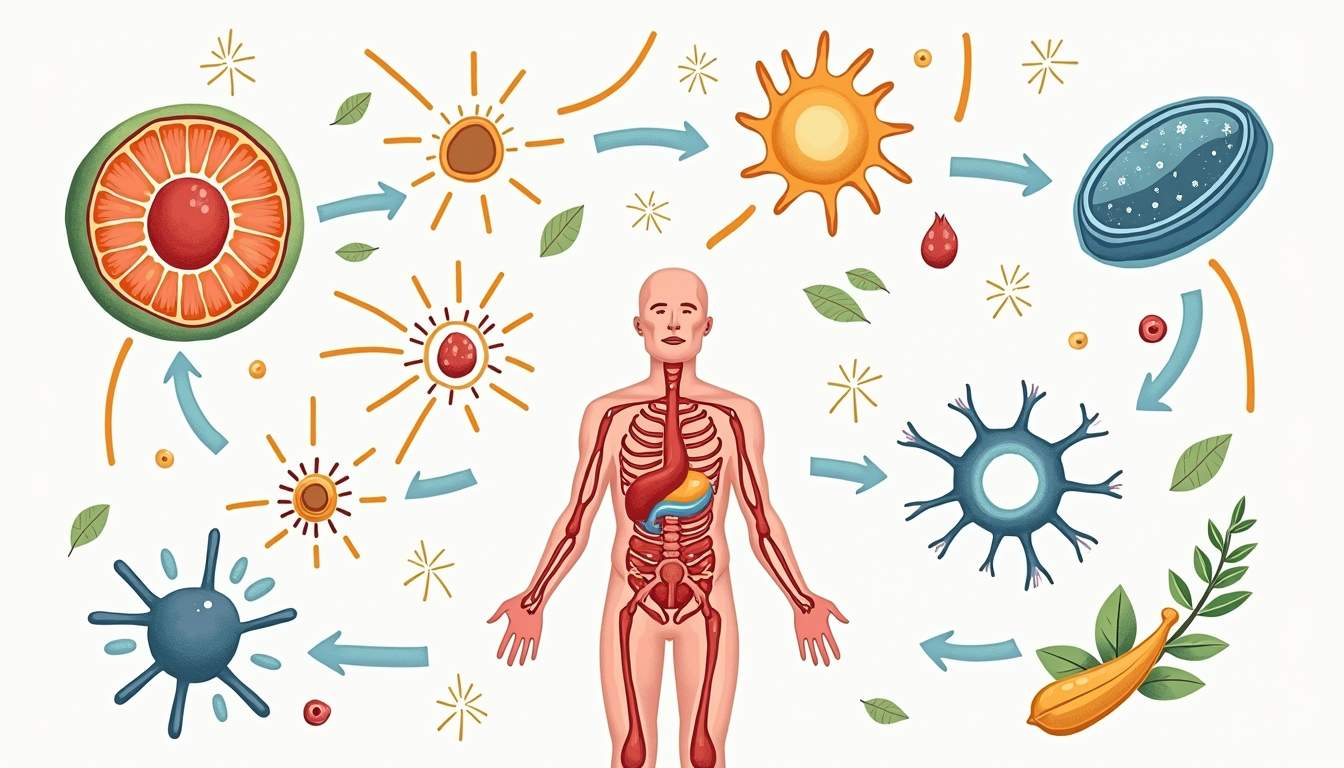Fatigue is a common complaint in today's fast-paced world, affecting individuals of all ages and lifestyles. While there are numerous factors that contribute to feelings of tiredness, understanding the role of vitamins and nutrients in energy production can provide a pathway to revitalization. This article delves into the essential vitamins that can help boost energy levels and reduce fatigue naturally.
Q: What vitamins help boost energy and reduce fatigue naturally?
A: The best vitamins for naturally boosting energy and combating fatigue include:
-
Vitamin B12: Essential for red blood cell formation and converting nutrients into energy.
-
Vitamin B6: Helps convert glycogen into glucose, supporting energy and brain function.
-
Vitamin D: Maintains muscle health and combats fatigue associated with deficiency.
-
Iron: Crucial for oxygen transport in blood, preventing anemia-related tiredness.
-
Magnesium: Involved in ATP (energy) production and reduces muscle fatigue.
-
Vitamin C & E: Powerful antioxidants protecting cells from oxidative stress, enhancing vitality.
Understanding Energy Production in the Body
Energy production in the body is a complex process that involves various biochemical pathways. At its core, the body converts food into energy through cellular respiration, which takes place in the mitochondria of cells. Mitochondria are often referred to as the "powerhouses" of the cell, as they are responsible for generating adenosine triphosphate (ATP), the primary energy currency of the body. This process is not only vital for physical activities but also for essential functions such as digestion, circulation, and even cognitive processes. The efficiency of energy production can significantly impact overall health and vitality.

In order for this energy production to occur efficiently, a range of vitamins and minerals must be present. These nutrients play critical roles in the metabolic processes that convert carbohydrates, fats, and proteins into usable energy. For instance, magnesium is essential for ATP synthesis, while iron is crucial for transporting oxygen to cells, which is necessary for aerobic respiration. When the body lacks these essential nutrients, energy production can be hindered, leading to feelings of fatigue and lethargy. Furthermore, chronic energy depletion can affect mental clarity and emotional well-being, creating a cycle of fatigue that can be difficult to break.
How Cellular Energy Works: The Role of Mitochondria
Mitochondria are unique organelles found in nearly all eukaryotic cells. They function by breaking down nutrients and converting them into ATP through a series of chemical reactions known as the Krebs cycle and oxidative phosphorylation. This process requires a variety of vitamins, particularly B vitamins, which are crucial for transforming food into energy. The Krebs cycle, for example, relies on vitamin B1 (thiamine) and B2 (riboflavin) to facilitate the conversion of glucose into energy. This intricate dance of biochemical reactions highlights the importance of a balanced diet rich in these vitamins to support optimal mitochondrial function.
Additionally, mitochondria are involved in regulating cellular metabolism and maintaining overall cellular health. They play a role in apoptosis, the process of programmed cell death, which is essential for removing damaged cells and preventing disease. When mitochondrial function is compromised, it can lead to decreased energy levels and increased fatigue. Factors such as oxidative stress, inflammation, and environmental toxins can all negatively impact mitochondrial health. Therefore, supporting mitochondrial health through proper nutrition, regular exercise, and stress management is essential for maintaining energy and combating fatigue.
Common Causes of Fatigue and Energy Depletion
Fatigue can stem from various sources, including lifestyle choices, medical conditions, and nutritional deficiencies. Poor sleep quality, high-stress levels, and a lack of physical activity can all contribute to feelings of tiredness. Additionally, the modern lifestyle often leads to increased screen time and reduced exposure to natural light, which can disrupt circadian rhythms and further exacerbate fatigue. Furthermore, certain medical conditions such as anemia, hypothyroidism, and chronic fatigue syndrome can lead to persistent fatigue, making it essential to consult healthcare professionals for proper diagnosis and treatment.
Nutritional deficiencies are another significant factor in energy depletion. A diet lacking in essential vitamins and minerals can impair the body's ability to produce energy efficiently. For instance, deficiencies in vitamin D can affect muscle function and energy levels, while a lack of omega-3 fatty acids may impact brain health and mood. Identifying and addressing these deficiencies is crucial for restoring energy levels and enhancing overall well-being. Incorporating a variety of nutrient-dense foods, such as leafy greens, whole grains, lean proteins, and healthy fats, can help ensure that the body has the necessary building blocks for optimal energy production and overall health.
Essential B Vitamins for Energy Production
B vitamins play a pivotal role in energy metabolism. They are involved in converting carbohydrates, fats, and proteins into energy, making them essential for maintaining optimal energy levels. Among the B vitamins, B12 and B6 are particularly noteworthy for their energy-boosting properties.
Vitamin B12 and B6: The Powerhouse Energy Vitamins
Vitamin B12, also known as cobalamin, is essential for red blood cell formation and neurological function. It plays a crucial role in the metabolism of fatty acids and amino acids, which are vital for energy production. A deficiency in B12 can lead to anemia, fatigue, and weakness, highlighting its importance in maintaining energy levels. Additionally, B12 is found predominantly in animal products, making it particularly important for vegetarians and vegans to seek fortified foods or supplements to ensure they meet their nutritional needs.
Vitamin B6, or pyridoxine, is another key player in energy metabolism. It is involved in the conversion of glycogen to glucose, which is the body's primary source of energy during physical activity. Furthermore, B6 supports neurotransmitter synthesis, which can influence mood and energy levels. Research has shown that adequate levels of B6 can help improve cognitive function and reduce symptoms of depression, making it a vital nutrient for both physical and mental well-being. Together, B12 and B6 form a powerful duo that supports energy production and overall vitality.
Folate, Niacin and Riboflavin: Supporting Energy Metabolism
Folate (Vitamin B9) is crucial for DNA synthesis and repair, as well as for the production of red blood cells. It works closely with B12 to ensure proper cellular function and energy production. A deficiency in folate can lead to fatigue and decreased energy levels, making it essential for those looking to boost their vitality. Folate is particularly important during periods of rapid growth, such as pregnancy and adolescence, as it supports the development of healthy cells and tissues.
Niacin (Vitamin B3) is another important B vitamin that aids in converting food into energy. It plays a role in the metabolism of carbohydrates, fats, and proteins, helping to release energy from these macronutrients. Beyond its energy-boosting properties, niacin is also known for its role in maintaining healthy cholesterol levels and improving cardiovascular health. Niacin also supports healthy skin and nervous system function, further contributing to overall well-being. Meanwhile, Riboflavin (Vitamin B2) is involved in energy production by facilitating the conversion of carbohydrates and fats into energy. It also acts as an antioxidant, helping to protect cells from oxidative stress. Ensuring adequate intake of these B vitamins is vital for maintaining optimal energy levels and reducing fatigue. Foods rich in these vitamins include leafy greens, whole grains, nuts, and dairy products, making it easier to incorporate them into a balanced diet.
Other Key Nutrients for Combating Fatigue
While B vitamins are essential for energy production, other nutrients also play significant roles in combating fatigue. Vitamins D, C, and E, along with minerals like iron and magnesium, are crucial for maintaining energy levels and overall health.
Vitamin D, Iron and Magnesium: The Energy Trio
Vitamin D is often referred to as the "sunshine vitamin" due to its production in the skin following sun exposure. It is essential for bone health and immune function, but emerging research suggests it may also play a role in energy levels. Low vitamin D levels have been linked to fatigue and muscle weakness, making it important to maintain adequate levels through sunlight exposure or supplementation. Interestingly, vitamin D deficiency is quite common, especially in individuals who spend most of their time indoors or live in regions with limited sunlight. Therefore, incorporating foods rich in vitamin D, such as fatty fish, fortified dairy products, and egg yolks, can be beneficial in supporting energy levels.
Iron is a vital mineral that is necessary for the production of hemoglobin, the protein in red blood cells that carries oxygen throughout the body. Insufficient iron levels can lead to anemia, resulting in fatigue and decreased energy levels. Ensuring adequate iron intake through diet or supplementation is crucial for maintaining energy and preventing fatigue. Foods such as lean meats, beans, lentils, and spinach are excellent sources of iron. Additionally, pairing iron-rich foods with vitamin C sources, like citrus fruits or bell peppers, can enhance iron absorption, further supporting energy levels.
Magnesium is another key mineral that supports energy production by participating in over 300 biochemical reactions in the body. It is involved in converting food into energy and plays a role in muscle function and relaxation. Low magnesium levels can lead to fatigue, muscle cramps, and overall weakness, making it essential to include magnesium-rich foods in the diet. Nuts, seeds, whole grains, and leafy green vegetables are all great sources of magnesium. Moreover, stress can deplete magnesium levels, so managing stress through relaxation techniques or physical activity can also help maintain adequate magnesium levels and combat fatigue.
Antioxidant Vitamins C and E: Protecting Energy Systems
Vitamins C and E are powerful antioxidants that play a crucial role in protecting the body's energy systems from oxidative stress. Vitamin C is essential for collagen synthesis and supports the immune system, but it also helps combat fatigue by reducing oxidative damage to cells. Adequate vitamin C levels can enhance overall energy and vitality. Fruits and vegetables, particularly berries, oranges, and leafy greens, are rich in vitamin C and should be included in a balanced diet to support energy levels and overall health.
Vitamin E, another potent antioxidant, protects cell membranes from oxidative damage and supports immune function. It also plays a role in energy metabolism by aiding in the utilization of oxygen during physical activity. Ensuring sufficient intake of these antioxidant vitamins can help protect energy systems and reduce feelings of fatigue. Foods high in vitamin E include nuts, seeds, and vegetable oils. Additionally, incorporating a variety of colorful fruits and vegetables into your meals not only boosts vitamin intake but also provides a range of phytonutrients that can further enhance energy levels and overall well-being.
Conclusion
Boosting energy levels and combating fatigue naturally involves a multifaceted approach that includes proper nutrition and lifestyle choices. Essential vitamins, particularly B vitamins, along with key minerals and antioxidant vitamins, play a significant role in energy production and overall vitality. By ensuring adequate intake of these nutrients, individuals can support their body's energy systems and enhance their quality of life.

Incorporating a balanced diet rich in fruits, vegetables, whole grains, and lean proteins can provide the necessary vitamins and minerals to combat fatigue. Additionally, regular physical activity, adequate sleep, and stress management are crucial components of maintaining energy levels. By prioritizing nutrition and overall health, individuals can experience a renewed sense of energy and well-being.
Boost your energy naturally with our Premium Methylated Multivitamin—Shop Now!

Share:
Liquid vs. Powder Collagen: Which is More Effective for Skin and Joint Health?
How to Maximize the Benefits of Taking Collagen and Vitamins Together